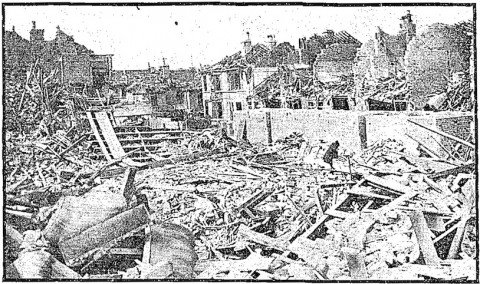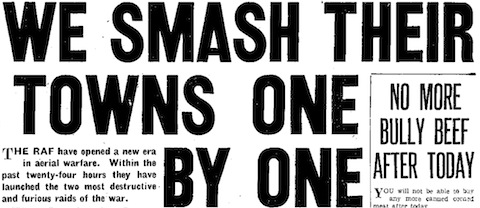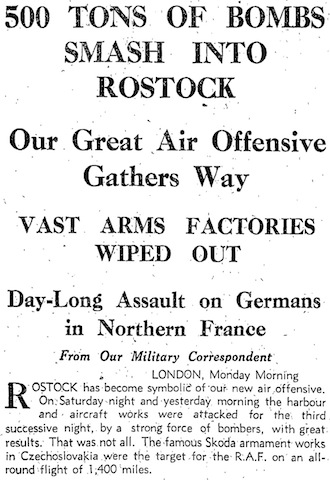
The Yorkshire Post, (above, 1), again leads with Rostock, which has been bombed by the RAF for the fourth consecutive night. The city 'is a heap of smouldering ruins, crushed by nearly 800 tons of British bombs. Its population is fleeing in panic. Its war production has ceased':
PHOTOGRAPHS taken after the third night's raid show swarms of people flocking towards the battered station to join crowds already waiting there for trains to take them away from what Berlin describes as 'terror raids.'
The paper's military correspondent claims that 'NO town has ever been battered so fiercely, even over weeks of cannonading, as Rostock':
Rostock is burning out, and losing all its usefulness in the process. Heinkel factories are a sorry wreck, and it must be assumed that many completed machines were destroyed.
Our assault on this arms town ranks second in R.A.F. achievements to the Battle of Britain. It has cut off supplies from two German armies, one in Finland and the other round Leningrad.
German newspapers do not deny that Rostock has suffered great damage, but do deny that it was a military target. The Times quotes the Börsen Zeitung at length, which speaks of 'the culture-raping barbarity of the British airmen' (4):
Pilots of all countries are accepting highly paid jobs in the British Air Force to render menial service in the destruction of German shrines of culture, and now Rostock's turn has come. Probably British agitators will again assert that the airmen attacked only military targets; but the real purpose, to terrify the German population, is too clear to be denied.
Dwelling houses, buildings of cultural value, and the centres of the welfare organization were hit. The Church of St. Nicholas, the old Grammar School, the municipal theatre, and the Guild House were damaged. This account also will one day come up for settlement.
There is also much publicity today for the heroes of the 17 April low-level raid on Augsburg, who yesterday were awarded between them one VC, one DSO, eight DFCs and ten DFMs. This coverage is clearly orchestrated by the Ministry of Information -- the Times carries (4) a photograph six of them with Brendan Bracken, the Minister of Information. The operation was carried out by twelve Lancasters, four of which were shot down en route and another three were lost on the way home. The South African winner of the VC, Acting Squadron Leader J. D. Nettleton, spoke to the press about the raid (The Times, 2):
The British airmen were surprised at the number of German people who waved to them as they flew just over the house-tops, but he did not think the people knew what the aircraft were. Firing at such low targets, the Germans hit houses with a number of their shells, and he believed that these caused considerable damage.
The target was the MAN factory which 'turned out half the engines used by the German submarine fleet, heavy tanks, and engines for armoured fighting vehicles'. Intelligence shows that the factory was 'badly damaged' in the raid. Nettleton believes that the results 'Absolutely' justified the losses of the 'splendid chaps we left behind'.
Yesterday, Fighter Command's Spitfires once again escorted Bostons and 'bomb-carrying Hurricanes' in raids on targets (mostly airfields) in Belgium and northern France (Mardyck, Le Touquet, St Omer, Lille, Ostend). German fighter defences were stronger than before: the RAF lost two bombers and sixteen fighters to the Luftwaffe's eleven fighters. The 'First American Eagle Squadron' had the most success in its 'exciting battle with F.W.190's' (Manchester Guardian, 5), claiming five -- 'Altogether it was a very satisfactory party', said one of the (presumably American) Eagles.
Less satisfactory is the continuing blitz on Malta: the Times uses the word 'devastation' in its headline (3). The Luftwaffe is bombing the island day and night, and is apparently deliberately attacking non-military targets. 'A woman correspondent of Reuter' reports from Malta that 'There is not a single building of the Knights of St. John which has not been destroyed or damaged. The palace of Grand Masters and the Auberges, or Inns of the Knights, have been completely or parly destroyed'. Eight churches have been destroyed or damaged; the Knights' military hospital, with its 520 foot ward 'stated to be the longest unsupported hall in Europe' is 'badly damaged'. Many people are sheltering in tunnels dug by the Knights under Mount Xiberras three centuries ago: there are now streets down there with regular (well, perhaps irregular) postal deliveries, and a chapel where Mass is said:
I was there this week during benediction, and shall never forget the echoing and re-echoing as hymns were sung by huge hidden crowds. The terrific barrage overhead failed to drown their voices. Even when bombs shook the shelter and blast caused some to lose their equilibrium, they remained undisturbed in silent prayer.
Bath was attacked for the second time early Monday morning with incendiaries and high explosive (other west and southwest towns, unnamed, were also raided). The above photograph appears in the Daily Express and shows the ruins of a street of houses. Montague Lacey reports from Bath that 'Serious damage has been done. The death roll is feared to be heavy. A large number of people have been injured' (4):
There are many homeless, but lodging is being provided for them as rapidly as possible. Historic buildings, churches -- two more were blitzed last night -- workers' houses and business premises have suffered severely. Two hospitals and an hotel got direct hits. The facade of one crescent, a Georgian gem, was badly damaged.
Post-raid relief services are operating effectively, but the public has been asked 'to refrain from travelling to and from Bath for the moment'.
According to the Yorkshire Post, Berlin radio has described Bath as the 'spa of plutocrats' (1):
"These raids are hitting the right people. Bath, as a place for people with rheumatism, sciatica and gout, has for centuries been the fashionable British resort but you could only go there when you had plenty of money.
"It is clear, then, that our raids have hit British plutocrats exclusively, with disastrous results. Those who have ordered the attacks on Germany are responsible for the reprisal raids."
The paper's London correspondent ridicules this, suggesting that 'Goebbels and his advisers have secured an old handbook on Bath, and are basing their radio talks, perhaps designedly, on information a century old' (2):
The announcer talked of Bath as though that stately city were still the fashionable resort of the days when Beau Nash, Jane Austen and Mr. Pickwick took the waters, and visited the pump and assembly rooms for social functions. Half the leaders of London's political and fashionable life, he implied, are in the habit at this time of year of retiring to Bath -- and it is they, and not the working classes, who are now being bombed.
The Express's leader writer is confident that, just as the great German air raids of a year ago 'did not cow the British spirit', neither will these (2):
It is no use pretending that Bath is not hurt by the raids -- even though they are small by comparison with those of the Luftwaffe last year and the R.A.F. this year -- that are now visited upon her citizens.
But we know that Bath will relive the spirit of sacrifice of the rest of Britain in 1941.
Those raids only created 'The will of a people that now rises up and demands assault on German power'; and in turn
THE bombing policy of the R.A.F. helps to rouse and sustain the British mood of attack.
[...]
These raids [on Rostock] are the pointer to the second front. They anticipate land-sea-air attack against Hitler for which Britain has armed itself. That way can come the speedy victory that bombing on its own cannot give.
Maybe so, but it appears that 'the raids of the R.A.F. raids are having a tremendous effect on the German population', as a Times report (based on 'persistent and trustworthy' information reaching neutral Turkey from Germany) says (3):
The bombing of Lübeck, in particular, has made them realize what is coming to them and has created real panic. German refugees, especially from western Germany, are fleeing to Austria, and even to Hungary, and in Vienna the authorities are being compelled to commandeer rooms in private houses because hotels and boarding-houses are overcrowded.
The prospect of 'at no distant date' feeling the full effects of America's entry into the war is also causing anxiety, as is of course general war-weariness in this, the third year of the war. But perhaps most important is the fact that 'the truth about the appalling losses in Russia has become gradually known'. People who used to become 'enraged at the slightest criticism or disrespectful reference to Hitler [...] now do not mince their words in accusing him of sacrificing German youth to his mad ambition'. For this reason there is pressure from 'Nazi -- and also Fascist -- leaders' to launch 'an immediate offensive in Russia or elsewhere to obtain some military successes which would calm down popular discontent'. But the military 'insist on waiting till preparations have been completed and until the weather makes operations on a big scale impossible'. This disagreement 'has lately taken a very acute form'.
There's a lot of other things going on today: further reactions to Hitler's speech, Russian claims of German atrocities, Japan's continuing advance in Burma. Gandhi has called for Indian soldiers to defend India, not foreigners -- especially not Americans: 'We know what American aid means. It amounts in the end to American influence, if not American rule added to the British' (Guardian, 5). And Roosevelt has announced a series of austerity measures, including heavy taxation: no individual should have an annual income larger than $25000 (£6250) after tax. In fact, this is the lead story in both the Times and the Guardian today.
![]() This work is licensed under a Creative Commons Attribution-NonCommercial-NoDerivatives 4.0 International License.
Permissions beyond the scope of this license may be available at http://airminded.org/copyright/.
This work is licensed under a Creative Commons Attribution-NonCommercial-NoDerivatives 4.0 International License.
Permissions beyond the scope of this license may be available at http://airminded.org/copyright/.






Pingback:
Airminded · Wednesday, 29 April 1942
Pingback:
Airminded · Thursday, 30 April 1942
Pingback:
Airminded · Friday, 1 May 1942
Pingback:
Airminded · Sunday, 3 May 1942
Pingback:
Airminded · Saturday, 2 May 1942
Pingback:
Airminded · Monday, 4 May 1942
Pingback:
Airminded · Post-blogging the Baedeker Blitz: conclusion